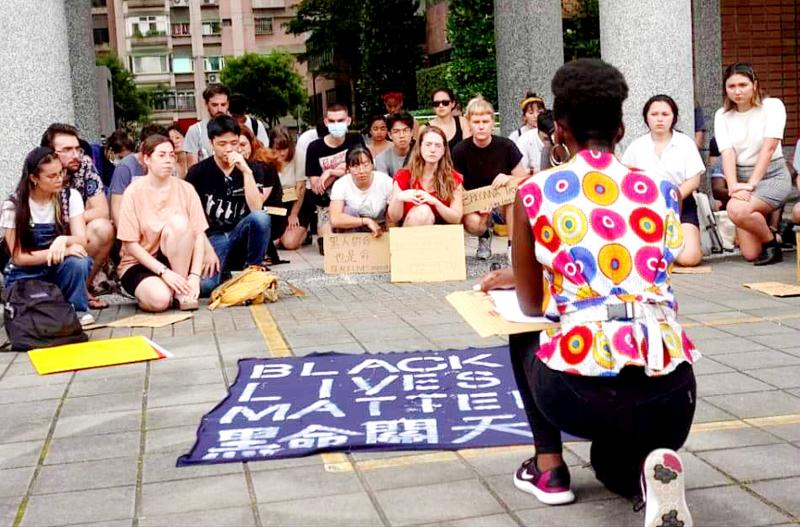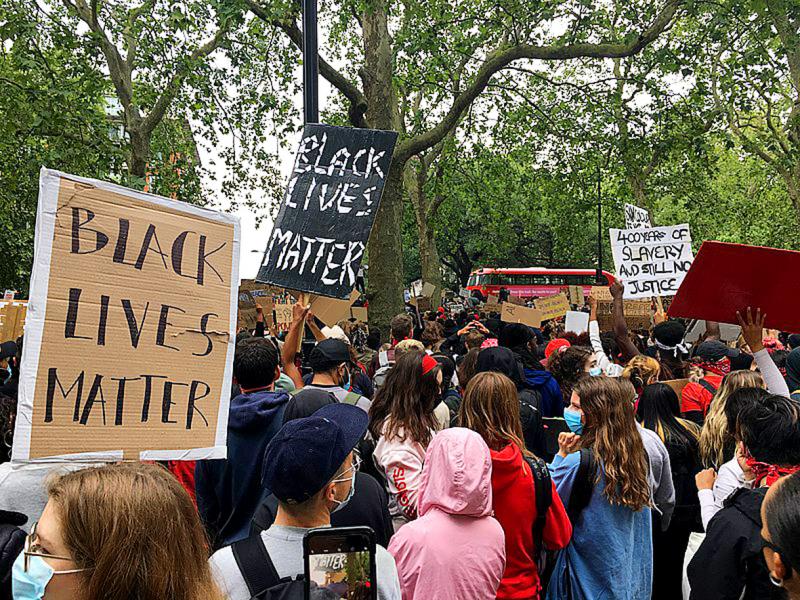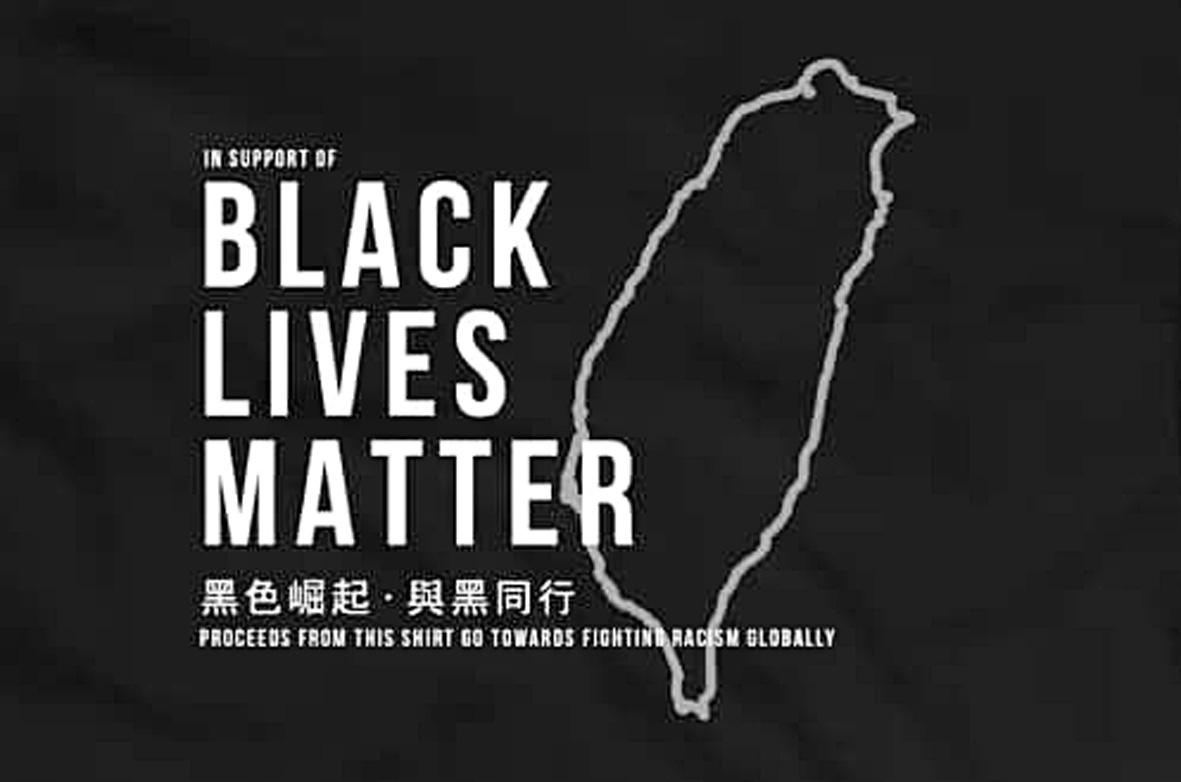Stefanie Davis found common ground with a Taiwanese student through racism. When the student talked about recent discrimination against Asians due to the COVID-19 pandemic, Davis, who is African-American, made a connection to the ongoing protests in the US.
“I was able to explain to him how I felt about George Floyd’s death,” she says. “Sometimes just for how I look, there’s a perspective about me. And that’s not fair. Even for students, it’s important to have that dialogue so you can further the conversation beyond that.”
As Black Lives Matter protests spread across the world, activity is quietly picking up in Taiwan in response to the death and the death of other black men at the hands of white police. Floyd died on May 25 when white Minneapolis police officer Derek Chauvin pressed his knee on the unarmed black man’s neck for nearly nine minutes.

Photo courtesy of Bertholeen Ngo Penda
Last Friday, National Taiwan University students held a small rally and on Saturday last week a day-long community forum discussed discrimination against people of color. Hundreds have signed up to attend a peaceful solidarity rally tomorrow at 228 Memorial Park.
“It’s a basic human rights issue,” rally co-organizer Patrick Springer says. “It’s something that affects all people, specifically people of color, not just in Taiwan, not just in America, but around the world.”
To those unaware of the underlying issues, however, all they see in the news are violent riots in a far-away country. The organizers stress that marginalization and oppression takes place all over the world, including Taiwan, and everyone should unify against it.

Photo courtesy of Wikimedia Commons
“Oppression is global,” co-organizer Erika Roman says. “We look at what’s going on in Hong Kong and China. We need to stand together and unite against that higher force. It’s that fear that stops people from reaching out to each other. Taiwan is at risk of being taken over by China at any given moment. They need support, just like Black Lives Matter in America needs support from its allies.”
DISCRIMINATION IN TAIWAN
While Black Lives Matter started as a protest against police brutality against African-Americans, many protesters have looked inward at the racism in their own countries.

Photo courtesy of Black Lives Solidarity Global Initiative
On Sunday, protestors in the UK tore down a statue of slave trader Edward Colston, which had stood in Bristol since 1895. Discrimination does exist in Taiwan, not just against black people but also Southeast Asians, Aborigines and the LGBT community.
“The thing is that people don’t do the work [to educate themselves] because they don’t think there is something wrong,” co-organizer Toi Windham says. “So it’s about awareness. We have to bring it to people’s attention that there’s racism around the world, and there’s a version of it in Taiwan.”
The local Black Lives Matter events so far have been organized by foreigners, and those who attend are likely aware of the issues. But the lack of awareness became clear as three blackface videos have appeared in the last month, even while the protests dominated the news cycle. While they were removed after public outrage, there was little discussion or attempt to explain why the content was offensive.
In fact, many people have asked Springer why they’re even putting on a rally since they don’t have to deal with the same level of racism in Taipei as they do in the US. But, Springer says, that doesn’t mean it doesn’t exist.
Sidestepping egregious incidents such a kindergarten posting a job ad on Facebook in 2018 that refused to hire English teachers who were “black or dark skinned,” all five organizers say that the racism they’ve encountered is mostly microaggressions — “actions that people don’t consider racist or even know are racist,” Springer says, citing as examples people constantly trying to touch his hair or crossing the street when they see him.
Taiwanese standards of beauty fetishize white skin. Roman repeats the words of a student: “teacher, black, ugly.”
“It’s very stereotypical, the lighter skin is the ideal,” Roman says.
“They may not see it as racism because they’re not hurting anyone. But you let your preconceived notion of someone you’ve never met guide how you act toward them,” he says. “We don’t deal with the overt ‘in-your-face, I want to cause you harm’ level that we deal with back home, but I think a lot of it comes with not interacting with a lot of black people,” Springer says.
SPREADING THE MESSAGE
Windham adds that most locals only see black people through movies, rap music or sports, “which is a very limited representation.”
“I realized that being here, I might be the only black person someone might encounter in their life,” Windham says.
That’s why they take their role as educators seriously, and hope that tomorrow’s rally will facilitate more conversation.
“We need to present other storylines about black people and educate people on how they can be understanding of this particular movement. It’s not just our movement. It translates to any disenfranchised and marginalized group,” Windham says.
A former English teacher and now a business owner, Springer says education starts with the people around them.
“It’s using those personal connections and getting people to realize that you do look different, and they should care about what’s happening with you because you’re someone they care about,” he says.
Roman’s connection to her students, who she teaches from 1st to 6th grade, is even closer “For me as a teacher, I understand that I will affect how they view people of color for the rest of their lives.”
The group hopes to hold more smaller scale discussions and events in the future.
“If you blame people, the problem won’t be fixed. We want Taiwanese to be part of the solution,” Windham says. “We want to approach it from a loving standpoint. Showing that we understand that this is how you may see us, but this is not okay.”
“It has to start,” Springer adds. “I tell my Taiwanese friends all the time, if you have any questions ask me — just don’t expect a feel-good happy answer. People have to be able to listen to that, because everyone’s experiences are valid.”

Jacques Poissant’s suffering stopped the day he asked his daughter if it would be “cowardly to ask to be helped to die.” The retired Canadian insurance adviser was 93, and “was wasting away” after a long battle with prostate cancer. “He no longer had any zest for life,” Josee Poissant said. Last year her mother made the same choice at 96 when she realized she would not be getting out of hospital. She died surrounded by her children and their partners listening to the music she loved. “She was at peace. She sang until she went to sleep.” Josee Poissant remembers it as a beautiful

March 2 to March 8 Gunfire rang out along the shore of the frontline island of Lieyu (烈嶼) on a foggy afternoon on March 7, 1987. By the time it was over, about 20 unarmed Vietnamese refugees — men, women, elderly and children — were dead. They were hastily buried, followed by decades of silence. Months later, opposition politicians and journalists tried to uncover what had happened, but conflicting accounts only deepened the confusion. One version suggested that government troops had mistakenly killed their own operatives attempting to return home from Vietnam. The military maintained that the

Before the last section of the round-the-island railway was electrified, one old blue train still chugged back and forth between Pingtung County’s Fangliao (枋寮) and Taitung (台東) stations once a day. It was so slow, was so hot (it had no air conditioning) and covered such a short distance, that the low fare still failed to attract many riders. This relic of the past was finally retired when the South Link Line was fully electrified on Dec. 23, 2020. A wave of nostalgia surrounded the termination of the Ordinary Train service, as these train carriages had been in use for decades

Lori Sepich smoked for years and sometimes skipped taking her blood pressure medicine. But she never thought she’d have a heart attack. The possibility “just wasn’t registering with me,” said the 64-year-old from Memphis, Tennessee, who suffered two of them 13 years apart. She’s far from alone. More than 60 million women in the US live with cardiovascular disease, which includes heart disease as well as stroke, heart failure and atrial fibrillation. And despite the myth that heart attacks mostly strike men, women are vulnerable too. Overall in the US, 1 in 5 women dies of cardiovascular disease each year, 37,000 of them